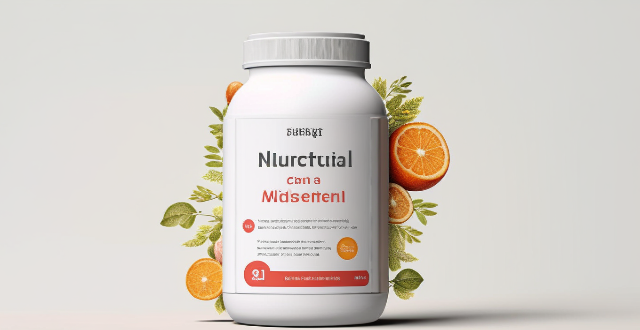Supplement Recovery

Can sports supplements help with muscle recovery after workouts ?
Can Sports Supplements Help with Muscle Recovery After Workouts? Physical exercise and workouts are essential for maintaining a healthy lifestyle, but they can also lead to muscle fatigue and soreness. Many athletes and fitness enthusiasts turn to sports supplements to aid in muscle recovery after workouts. But do these supplements really work? Let's explore the topic in detail. What are Sports Supplements? Sports supplements are dietary products designed to enhance athletic performance, improve physical health, and support recovery from exercise. They come in various forms, including powders, pills, and liquids, and can be consumed before, during, or after workouts. Types of Sports Supplements - Protein Powders: Help in muscle repair and growth. - Creatine: Boosts energy production in muscles. - Branched-Chain Amino Acids (BCAAs): Support muscle building and recovery. - Glutamine: Aids in muscle recovery and immune function. - Omega-3 Fatty Acids: Reduce inflammation and promote heart health. - Multivitamins/Minerals: Support overall health and wellness. How Do Sports Supplements Help with Muscle Recovery? - Protein Powders: Consuming protein powders after a workout can help replenish depleted amino acids, leading to faster recovery times. - Creatine: Increases the availability of phosphocreatine, which helps regenerate ATP more quickly during high-intensity exercises, reducing muscle fatigue and aiding in recovery. - BCAAs: Consuming BCAA supplements before or during workouts can reduce muscle damage and speed up recovery processes. - Glutamine: Supports muscle recovery by helping maintain cellular volume and preventing muscle breakdown. It also supports immune function, which is important for overall health and recovery. - Omega-3 Fatty Acids: Have anti-inflammatory properties that can help reduce muscle soreness and stiffness after workouts. They also support heart health, which is crucial for athletes who engage in cardiovascular exercises. - Multivitamins/Minerals: While not directly related to muscle recovery, consuming multivitamins or minerals can support overall health and wellness, which indirectly aids in recovery processes. Are Sports Supplements Safe? While sports supplements can be beneficial for some individuals, it's important to note that they are not regulated by the Food and Drug Administration (FDA). This means that their safety and effectiveness may vary between brands and products. It's always best to consult with a healthcare professional before starting any supplement regimen. Additionally, relying solely on supplements without proper nutrition and rest can be counterproductive. A balanced diet, adequate sleep, and proper hydration are still key components of effective muscle recovery.

How do sports nutrition supplements affect muscle recovery after a workout ?
Sports nutrition supplements can significantly support muscle recovery post-workout by providing essential nutrients. Protein supplements like whey and casein replenish amino acids, while carbohydrate supplements such as BCAAs and beta-alanine reduce soreness and fatigue. Other nutrients, including creatine, glutamine, and vitamins/minerals, further enhance recovery. A structured supplementation routine, tailored to individual needs, can optimize muscle recovery and athletic performance.

How do I choose the right sports nutrition supplement for my specific sport or activity ?
When it comes to sports nutrition, supplements can playWhen it comes to sports nutrition, supplements can play performance, recovery, and overall supplements can play a crucial role in enhancing performance, recovery, and overall health. However, with so many options available on the market, it can be challenging to determine which supplement is best suited for your specific sport or activity. Here are some tips to help you make an informed decision: - Identify Your Goals: Before choosing a sports nutrition supplement, it's essential to identify your goals. Are you looking to increase endurance, build muscle, lose weight, or improve recovery? Different supplements are designed to address different needs, so understanding your objectives will help you narrow down your options. - Research the Types of Supplements Available: There are various types of sports nutrition supplements, including protein powders, amino acids, creatine, beta-alanine, and pre-workout formulas. Each type of supplement has its unique benefits and drawbacks, so it's crucial to research each option thoroughly before making a decision. - Consider Your Dietary Needs: Your dietary needs play a significant role in determining which sports nutrition supplement is right for you. For example, if you're following a plant-based diet, you may need to look for vegan-friendly supplements that provide essential nutrients like iron, calcium, and vitamin B12. Additionally, if you have any food allergies or sensitivities, it's important to check the ingredients list of potential supplements to ensure they don't contain any allergens. - Evaluate Brand Reputation and Quality Assurance: Not all sports nutrition supplements are created equal. It's crucial to choose a reputable brand that prioritizes quality assurance and third-party testing. Look for brands that are transparent about their manufacturing processes and ingredient sourcing. Reading customer reviews and seeking recommendations from other athletes or coaches can also help you make an informed decision. - Consult with a Healthcare Professional: Before starting any new supplement regimen, it's always a good idea to consult with a healthcare professional, such as a registered dietitian or sports medicine physician. They can provide personalized advice based on your individual needs and help you avoid potential interactions with medications or existing health conditions. - Start with Small Doses and Monitor Effects: Once you've chosen a sports nutrition supplement, start with small doses and monitor how your body responds. Pay attention to any changes in energy levels, recovery time, or overall performance. If you experience any adverse effects or don't notice any improvements after several weeks, consider trying a different supplement or adjusting your dosage. In conclusion, choosing the right sports nutrition supplement requires careful consideration of your goals, dietary needs, and individual preferences. By researching your options, evaluating brand reputation, consulting with healthcare professionals, and monitoring your body's response, you can find a supplement that supports your specific sport or activity and helps you achieve optimal performance.

What role does nutrition play in sports injury recovery ?
Nutrition plays a crucial role in sports injury recovery by providing the body with essential nutrients for tissue repair and growth. Protein, vitamins, minerals, and fluids are all important for healing, and proper nutrition can help speed up the process. In addition to nutrition, other factors such as rest, stress management, and physical therapy also play a role in sports injury recovery.

What are the most popular sports supplements ?
The most popular sports supplements include protein powders, creatine monohydrate, beta-alanine, caffeine, BCAAs, and multivitamins/minerals. These supplements offer benefits such as muscle growth, increased strength, improved endurance, and faster recovery. However, they should not replace a balanced diet and proper training regimen. Consultation with a healthcare professional is recommended before starting any new supplement regimen.

Are there any side effects of taking sports supplements ?
Sports supplements can enhance athletic performance and support recovery, but potential side effects include digestive issues from protein supplements, dehydration from creatine, increased heart rate from pre-workout stimulants, cardiovascular risks from weight loss supplements, and overdose risks from multivitamins. It is recommended to consult with a healthcare professional before starting any supplement regimen to ensure safety and effectiveness.

Are sports supplements safe for athletes ?
Sports supplements claim to enhance athletic performance, but their safety is a concern. Factors affecting safety include lack of regulation, potential side effects, interactions with other medications, and individual allergies or sensitivities. Athletes should prioritize safety by using well-researched supplements, following recommended dosages, and consulting with healthcare professionals.

What role does technology play in modern disaster response and recovery ?
Technology plays a vital role in modern disaster response and recovery by enhancing early warning systems, improving communication and coordination, and enabling efficient data collection and analysis.

Can taking sports nutrition supplements lead to health risks or side effects ?
Sports nutrition supplements can enhance performance and recovery but may pose health risks and side effects such as overdosing, contamination, interactions with medication, and allergic reactions. However, when used appropriately, they can also improve performance, increase muscle mass, aid in recovery, and replenish nutrients. It is crucial to research each supplement, follow recommended dosages, and consult with a healthcare professional to minimize risks and maximize benefits.

What are the benefits of taking sports supplements ?
Sports supplements offer a range of benefits for athletes, from improved performance and faster recovery to optimized nutrition and health maintenance. They can also enhance mental clarity, provide convenience, aid in weight management, and support hormonal balance. It's crucial to consult with a healthcare professional before using any supplements to ensure they are safe and effective for individual needs and goals.

Can sports supplements improve athletic performance ?
Sports supplements claim to enhance athletic performance, but their effectiveness varies. Common types include protein, creatine, pre-workout, BCAAs, and multivitamins/minerals. Some studies support their benefits, especially when used correctly and in conjunction with proper nutrition and training. However, potential downsides include health risks, unproven claims, and high costs. Consult a healthcare professional before using sports supplements to ensure they align with individual goals and health status.

What are the best sports nutrition supplements for enhancing athletic performance ?
The article discusses the importance of sports nutrition supplements in enhancing athletic performance. It highlights five key supplements that can help athletes improve their performance: 1. Protein Supplements: Essential for building and repairing muscles, protein supplements like whey, casein, and soy protein can support muscle growth, increase strength, and improve body composition. 2. Creatine Supplements: Popular among athletes for increasing muscle mass and improving performance during short, high-intensity exercise. Creatine also enhances recovery between workouts. 3. Beta-Alanine Supplements: An amino acid that increases muscle carnosine levels, beta-alanine can improve endurance capacity during high-intensity exercise, reduce fatigue, and enhance muscle strength and power. 4. Caffeine Supplements: A natural stimulant that can increase energy levels, reduce fatigue, improve mental focus, and enhance endurance capacity during prolonged exercise. 5. Multivitamins and Minerals Supplements: Important for overall health and well-being, multivitamins and minerals can help prevent nutrient deficiencies that could impair performance and enhance immune function and recovery from training. The article emphasizes the importance of choosing safe and effective supplements that meet the specific needs of an athlete and consulting with a healthcare professional or registered dietitian before starting any new supplement regimen.

What is the importance of recovery in sports training ?
Recovery is a crucial aspect of sports training that often gets overlooked. Athletes and coaches need to understand the importance of recovery and make it an integral part of their training programs. Recovery refers to the process of restoring the body's energy reserves and repairing damaged tissues after physical activity. It is essential for athletes because it allows them to prevent overtraining, promote tissue repair and growth, and enhance mental well-being. There are several effective recovery strategies that athletes can incorporate into their training programs, including active recovery, passive recovery, hydration and nutrition, and sleep. By incorporating these strategies into their training programs, athletes can maximize their recovery benefits and improve their performance on the field or court.

What are the best post-workout recovery techniques
The text discusses the importance of post-workout recovery for achieving optimal physical performance and preventing injuries. The author recommends several techniques including stretching, hydration, protein intake, foam rolling, massage therapy, active recovery, and sleep. Stretching improves flexibility and reduces muscle soreness, while hydration replaces lost fluids during exercise. Protein intake helps repair and rebuild muscles, foam rolling relieves muscle tension, massage therapy reduces inflammation, active recovery promotes circulation, and sleep allows the body to repair and rebuild itself. Incorporating these techniques into a routine can help improve performance and prevent injuries.

What are the key indicators of economic recovery ?
Economic recovery is a complex process that involves several key indicators. These indicators are used to gauge the health and growth of an economy after a period of decline or recession. Some of the most important indicators of economic recovery include GDP growth, employment rates, consumer spending, business investment, the housing market, inflation rates, trade balance, and stock market performance. Each of these indicators provides valuable insights into the overall health and growth of an economy.

How does economic recovery affect different industries differently ?
Economic recovery affects industries differently based on their reliance on consumer spending, investment, government policies, and global markets. Consumer discretionary sectors like retail and hospitality are highly sensitive to economic fluctuations but can rebound quickly with increased consumer confidence. The technology sector often remains resilient during downturns, with continued growth in segments like software and online services. Manufacturing may face challenges due to supply chain disruptions but can rapidly expand with demand recovery. Financial services benefit from improved credit conditions and increased lending activities. Healthcare is generally less affected by economic cycles and can grow with aging populations. Energy sector recovery depends on global demand and policy shifts towards renewable energy. Understanding these differential impacts is crucial for investors, policymakers, and businesses to navigate the changing landscape effectively.

Can physical therapy help with sports injury recovery ?
Physical therapy is beneficial for sports injury recovery, addressPhysical therapy is beneficial for sports injury recovery, address restoration, injury prevention, and addressing pain management, function restoration, injury prevention, and supporting a safe return to activity. It involves assessment, diagnosis, manual therapy, range of motion exercises, strengthening exercises, stretching, balance training, functional training, gradual increase in activity, and education on injury prevention and home exercise programs.

How does sleep deprivation affect muscle recovery after workouts ?
Sleep is crucial for muscle recovery after workouts, as it allows the body to repair and rebuild damaged muscle tissue. Sleep deprivation reduces growth hormone production and protein synthesis, leading to inefficient muscle recovery. Strategies for improving sleep quality include establishing a consistent sleep schedule, creating a relaxing bedtime routine, avoiding screens before bed, getting plenty of exercise, and creating a comfortable sleeping environment. By prioritizing sleep, you can improve muscle recovery and overall health.

What are the best exercises for sports recovery ?
The text discusses the importance of sports recovery and suggests various exercises to aid in this process. The exercises include stretching, foam rolling, light cardiovascular exercise, and yoga. Stretching helps increase blood flow, reduce muscle tension, and improve flexibility. Foam rolling relieves muscle tightness and soreness by applying pressure to specific areas of the body. Light cardiovascular exercise increases blood flow and promotes recovery. Yoga improves flexibility, reduces stress, and promotes relaxation while also improving balance and stability. The author suggests several specific exercises for each category to help athletes recover from their workouts or competitions.

How important is rest and recovery in skill enhancement ?
The text discusses the importance of rest and recovery in the process of skill enhancement. It highlights the cognitive and physical benefits of taking breaks, such as improved mental clarity, memory consolidation, muscle recovery, and injury prevention. The practical implications include avoiding burnout, enhancing performance, and strategies for incorporating rest into practice schedules. Overall, the text emphasizes that rest is a crucial component of long-term skill development and should be given equal consideration alongside deliberate practice and training regimens.

How does stretching help with recovery after a workout ?
Stretching is crucial for recovery after a workout. It improves blood circulation, reduces muscle soreness and stiffness, enhances flexibility, promotes better range of motion, prevents injury, and reduces stress. Incorporating stretching into your post-workout routine can greatly enhance your recovery process.

How should I choose the right sports supplement for me ?
When selecting a sports supplement, consider your fitness goals, research ingredients, read reviews, consult professionals, and start with a small dose.

How important is rest and recovery in a sports training plan ?
This article emphasizes the importance of rest and recovery in a sports training plan. It highlights that incorporating rest and recovery into a routine can prevent overtraining, enhance performance, and reduce the risk of injury. The article provides tips on how to incorporate rest and recovery into a training plan, such as scheduling regular rest days, using active recovery techniques, getting enough sleep, and staying hydrated. Overall, the article stresses the significance of giving the body time to heal and repair itself for optimal performance levels.

How does sports psychology contribute to injury recovery and rehabilitation ?
Sports psychology can contribute to injury recovery and rehabilitation by helping athletes cope with psychological challenges, develop confidence and self-belief, establish good habits and routines, and adjust to life after injury. Incorporating sports psychology into an athlete's rehabilitation program can lead to better results and quicker recovery.

What role do small businesses play in economic recovery ?
Small businesses are crucial for economic recovery, contributing toSmall businesses are crucial for economic recovery, contributing to diversification of the economy, contributing to job creation, innovation, diversification of the economy, local economic development, and entrepreneurship. They create new jobs, adapt quickly to market changes, offer a wide range of goods and services, support local economies, and encourage self-employment. Governments should provide them with necessary support during economic uncertainties.

Is it necessary to take supplements for sports nutrition ?
Supplements for sports nutrition are a controversial topic, with some athletes swearing by them and others considering them unnecessary or even harmful. The necessity of taking such supplements depends on various factors including an individual's diet, training intensity, and specific goals. Sports nutrition supplements come in various forms like pills, powders, bars, and liquids, and include protein supplements, creatine, beta-alanine, caffeine, BCAAs, pre-workout formulas, and post-workout formulas. While a balanced diet can provide most of the nutrients needed for optimal athletic performance, there are certain situations where supplements may be beneficial. These include inadequate nutrient intake from food alone, high-intensity or endurance training, and specific goals or deficiencies. However, there are also potential risks associated with taking sports nutrition supplements, such as overconsumption and imbalanced nutrient intake, contamination and quality concerns, and interactions with medications or other supplements. Therefore, it is essential to choose reputable brands, check for third-party certifications whenever possible, and consult with a healthcare professional before starting any new supplement regimen. In conclusion, whether or not it is necessary to take supplements for sports nutrition depends on individual circumstances. While they can offer benefits for certain athletes and scenarios, they should not replace a well-rounded diet rich in whole foods. Before incorporating any supplements into your routine, consider your specific needs and goals and consult with a qualified healthcare professional or registered dietitian for personalized advice.

How much protein do I need for muscle recovery ?
Protein is vital for muscle recovery, especially after intense workouts. Sedentary adults need 0.8g/kg, while athletes require more. Timing and quality of protein intake matter. Tips include dietary variety, supplementation if needed, meal planning, and monitoring intake.

How do high-tech training facilities contribute to athlete development and recovery ?
High-tech training facilities contribute to athlete development and recovery by providing advanced equipment, technologies, and personalized programs. These resources help improve performance, prevent injuries, and facilitate efficient recovery.

How do insurance mechanisms support disaster risk management and recovery processes ?
Insurance mechanisms play a vital role in supporting disaster risk management and recovery processes, providing financial protection to individuals, businesses, and governments against the economic impacts of natural disasters. They encourage risk mitigation measures, offer financial protection through various policies, facilitate recovery and reconstruction, invest in catastrophe modeling and research, and create public-private partnerships to improve disaster preparedness and response.